The Horror Tree Presents…An Interview with Eric S. Brown
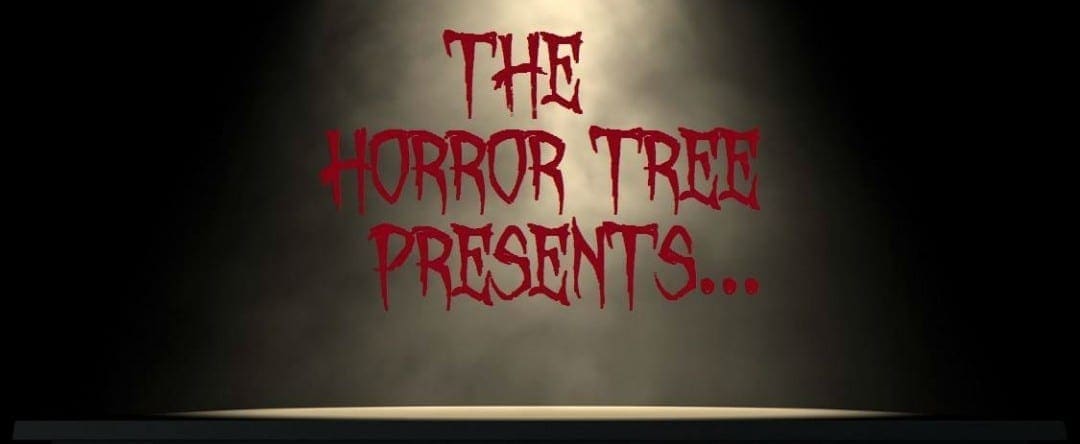
 Hi Eric, and welcome to Horror Tree! I’m so glad I get to finally sit down and talk to you. It’s been quite the lengthy experience researching all your many books and tracing your career. Coffee or what type of drink to start?
Hi Eric, and welcome to Horror Tree! I’m so glad I get to finally sit down and talk to you. It’s been quite the lengthy experience researching all your many books and tracing your career. Coffee or what type of drink to start?
Eric: I’m a coffee person too though I typically prefer mine cold and black.
Erin: Wonderful, we’ll have coffee then, yours cold and black, mine hot with plenty of cream and sugar. Now that we’re settling, let’s jump right in! Firstly, Eric Brown is a common name even in writing and film, so let’s set it straight which Eric YOU are Eric S. Brown. Tell us a short bit about yourself and what you do.
Eric: I’m a professional horror and science fiction writer living in rural North Carolina. I’ve been a comic book collector since I was four years old, am a diehard BSG fan (or Colonial if you prefer) and am married with two children and two cats. In the last seventeen years I have had over one hundred novels and novellas published along with over five hundred short stories. I’ve also edited a handful of anthologies and currently write ongoing columns for both a local newspaper and Altered Reality Magazine. I’ve written for places as large as Simon and Schuster and Baen Books and places as small as Great Old Ones Publishing and MoonDream Press. As long as there is a paycheck involved, I will write for just about anyone. I became a writer because of my love of genre fiction and comics but it was reading the works of David Drake that taught me how to write. The man is my personal hero of the writing world and I have had the pleasure to meet and work with him on various projects several times. And I suppose I should mention that some of work has been adapted into film. “Bigfoot War” was the first (and most infamous) of those but “Werewolf Massacre at Hell’s Gate” and “Cult of the Shadow People” were produced by a smaller company as well.
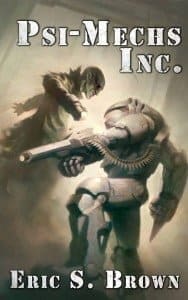 Erin: I’ve scoured through your Amazon and GoodReads and other such pages and my eyes started to bug out realizing how many books you’ve written. From bigfoot to underwater creatures, what is your favorite to write about?
Erin: I’ve scoured through your Amazon and GoodReads and other such pages and my eyes started to bug out realizing how many books you’ve written. From bigfoot to underwater creatures, what is your favorite to write about?
Eric: My favorite changes all the time. I spent eight years writing mainly just zombie stuff, then several more years doing pretty much nothing but Bigfoot horror. This year at least, Mecha, vampires, and psionics have been what I have enjoyed most. I had wanted to do a novel that combined all three of those for a long while but never found a publisher crazy enough to take something like that on until I met Chris Kennedy. His company is truly amazing. I had already done a short story and a book for his Seventh Seal Press imprint set in the best-selling Four Horsemen universe, so I pitched my idea to him and we settled on a deal for a novel entitled “Psi-Mechs Inc”. I wrote the first Psi-Mechs Inc. novel in about a month. When it was released, it did well and was expanded into a trilogy including the sequel novels “Darker Nights” and “The Vampire War.” Chris’s Blood Moon Press imprint released the entire trilogy this year. After that, I went on to write a purely SF novel for Theogony Books, entitled “Miranda’s War,” that is set for release this December 21st. I owe Chris a lot not just for having faith in my work but convincing me that I could write full length novels. Up until “Psi-Mechs Inc.,” I had never written a full-length novel on my own without a co-author but thanks to Chris, I’ve hammered out four already this year.
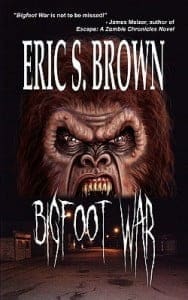 Erin: Where do you get your ideas for them from and how do you structure your work. Do you outline or write at will?
Erin: Where do you get your ideas for them from and how do you structure your work. Do you outline or write at will?
Eric: I grew up a horror, SF, and comic book geek so I like to think I am pretty well versed in those genres. Coming up with ideas isn’t really a hard thing. I just think about what I would like to see out there as a fan and run with that. In addition, I have gotten to a point with some publishers like Severed Press where I just write whatever sort of book they happen to need at the moment. Sure, it takes some creativity out of things in a sense but it allows me to write full time knowing I will Lord willing have work that is waiting for me when I finish whatever current project I am doing. As to outlining, I have done it but I usually don’t and certainly never on anything smaller than a full length novel.
Erin: What advice do you have for other writers who want to write good action sequences into their books?
Eric: Read David Drake, especially his Hammer’s Slammers series. The man couldn’t write a bad action scene if you held a gun to his head and threatened his life over it. Reading his work is how I learned to write action.
Erin: I saw that the first book in your Bigfoot Wars series was made into a feature film by Origins Releasing. What was the process for you like? What did it entail?
Eric: It all started kind of strange. Studio 3 Entertainment was making a new “Legend of Boggy Creek” film and the director was looking for someone to do a novelization of it. At the time, “Bigfoot War” was huge and fairly unique. He found me because of that book and not only hired me for the novelization but optioned “Bigfoot War” at the same time. Two years went by and I figured nothing would ever come of the option then one day I got a call out of the blue telling me that the project had been given the greenlight. I had my contract a day or two later and got paid for the rights that summer. It was a pretty amazing experience to sell movie rights. I think every writer hopes for that on some level. I however made the mistake that a lot of writers just getting into movies make and allowed the number of zeroes on the check to blind me to the fact that I would have no creative control on the project. I hated the movie but remain thankful for it to this day because that check bought my family and I a lot of freedom for several years. And keep in mind that beyond signing the contract and cashing the check, I had no involvement with the movie whatsoever.
Erin: I saw that one of the executives during the announcement of the film in 2013 said “It seems that interest in Cryptozoology and creatures such as the Bigfoot is timeless and evergreen. It never dies.” Do you think that’s still true, and if so, why?
Eric: I think so. People are always going to be fascinated by the unknown whether that is space travel or monsters lurking in the woods or sewers. There is a great escapism to spending your time reading, watching, or dreaming about those types of things.
Erin: Just this year, you’ve released I believe at least ten creature novellas and novels mostly all from Severed Press, from Sasquatch to Kraken. I am most excited for Terror Krakens, as I love anything ocean or sea horror/thriller. Firstly, how are you so prolific? What is your writing schedule entail that you can publish so many books?
Eric: Actually, I have had fifteen new books released this year as well as an anthology I complied for Crystal Lake Publishing. I have two more books slated for release by the end of the year as well. As to how I am so prolific, well, I have bills to pay and kids to feed. Not much of a choice really. One had to work to keep the money coming in. It doesn’t hurt that I really enjoy what I do most of the time either. I don’t really have a set writing schedule. I just get try to dive straight into writing as soon as my wife and kids are out the door in the morning. I like to aim for at least three thousand words a day but that doesn’t always happen. Some days it’s a struggle to get just a thousand and others I can do five thousand or more easily. I’ve been told I am a fast writer, but I don’t see myself that way. I tend to think I am a slacker and know that I could do more than I do if I didn’t read so many comics, etc.
Erin: Oh, wow I counted wrong then. That’s a lot of books! Secondly, how do you research for these various titles and provide examples?
Eric: Yeesh. I don’t really research at all for my monster books unless it’s military jargon or weapons. I’ve been doing monsters for so long now I am comfortable just writing most of the time. For other books like “Casper Alamo” though, I really had to learn a lot. I wanted to retell the story of the Alamo with Mecha vs. Aliens while keeping it as close to the real-life battle as I could and spent hours learning about the Alamo and its defenders.
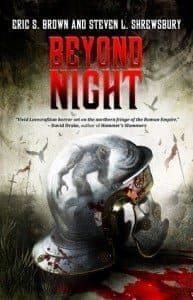 Erin: You also released “Beyond Night” in collaboration with co-author Stephen L. Shrewsbury, which I found interesting myself upon its release as it has fantasy, action, sorcery, horror, historical fiction all rolled into one novel (meshing a lot of my favorite genres together). In the back-cover copy for the title it states: It’s Bigfoot War mixed with Lovecraftian horror on the edge of the Roman Empire. How do you come up with scenarios like this and how do you convince a publisher to take something like on?
Erin: You also released “Beyond Night” in collaboration with co-author Stephen L. Shrewsbury, which I found interesting myself upon its release as it has fantasy, action, sorcery, horror, historical fiction all rolled into one novel (meshing a lot of my favorite genres together). In the back-cover copy for the title it states: It’s Bigfoot War mixed with Lovecraftian horror on the edge of the Roman Empire. How do you come up with scenarios like this and how do you convince a publisher to take something like on?
Eric: As I have mentioned, I love the works of David Drake. Dave has written a good deal of Roman books over the years and I really wanted to take a stab at following in his footsteps in that regard. Dave is a real scholar while I am just a geek who writes stories so that where Shrews came in. He knows his history, so we tackled that one together. “Beyond Night” is a very Robert E. Howard/David Drake style book. As to how I convinced the publisher, I have no idea. I just asked them and they said yes. I guess looking at my past books they hoped I knew what I was doing.
Erin: How much research and planning went into it? How did Stephen and you handle co-writing this? What was the process?
Eric: Shrews (Stephen) carried the weight and did all the hard work on the novel. History is his thing. I just came up with the story idea, turned him loose on it, and added a lot of angry beasts tearing folks apart.
Erin: You have co-authored many other things with various authors as well over a 17-year career. Do you like working with a co-author? What are the positive merits you love and what are the challenges?
Eric: I love working with other writers. It’s always cool to blend two different styles of writing and ways of approaching a given story. The most challenging part for me is usually waiting on my co-author’s next section to come in. I can be pretty driven to get things done and move at a decently fast pace.
Erin: What would you tell someone who is hesitant to co-write a book with someone else?
Eric: As long as you make sure the person you’re working with is someone you’re comfortable with, there shouldn’t be anything stopping you from doing it. Just know that the book is a team effort and expect to be ready to compromise when you need to.
Erin: I noticed you often mix history into your various books and it’s safe to say you write across several genres with many of your books. What do you think this lends you as an author as opposed to someone who writes strictly only one genre?
Eric: Nah, not really. I just write what I enjoy whether that’s Roman soldiers, old west gunfighters, or the battlefields of World War II. I’ve always enjoyed reading period stuff so writing it was just something that came naturally to me, I guess. As to your question, I have always believed that a writer can write anything if they put effort into it. Having a varied background in my own fandom though I think may allow me blend things in ways that other writers might not.
Erin: To go back to the beginning of your career for a moment, many say in 2003 with your first book, you become an expert on the zombie genre. How did evolve? And then how did (it seems it did) your work evolve out of the zombie genre?
Eric: I count it as 2001 with the publication my first story in Burning Sky magazine # 9 which was indeed a zombie story. When I started out, I wanted to be a Military SF writer like David Drake but lacked his real-life military background. At the time, I lived and breathed zombies. I watched all the movies and read most of what few books there were back then as it was before zombies were mainstream. And since it was my zombie stories that sold, those are what I wrote. Don’t get me wrong, I loved writing them too. After eight years of writing tons of zombie stories, people in the small press just started calling me “the king of zombies.” Of course, again this before or right as they were making a comeback.
As the sub-genre really got popular again, I switched over to writing Bigfoot Apocalypse books like “Bigfoot War.” I credit a lot of folks thinking I am an expert to Jonathon Maberry’s book “Zombie CSU.”
I had taken some extensive time away from writing when my son was born and was shocked when Mr. Maberry wanted to interview me in the book. I ended up having a larger interview in it than Robert Kirkman (mind-blowing but true!) After that, Simon and Schuster hunted me down and picked up the rights to “War of the Worlds Plus Blood Guts and Zombies.” I didn’t even have an agent. I had to get one just to work with them even though they came to me. That was the peak of my time writing zombies and by then I was tired of them as a writer and moved on to Bigfoot horror and other things.
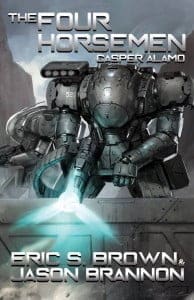 Erin: How did it feel to write a book with H.G. Wells? *wink* In all seriousness, you did technically as I noticed your “War of the Worlds Plus Blood Guts and Zombies” you had written years ago, in which you interspersed content in the way of “Pride of Prejudice Zombies,” correct? That’s pretty interesting! What was that writing process like and how did you make it flow so seamlessly? Were there any rules you had to follow?
Erin: How did it feel to write a book with H.G. Wells? *wink* In all seriousness, you did technically as I noticed your “War of the Worlds Plus Blood Guts and Zombies” you had written years ago, in which you interspersed content in the way of “Pride of Prejudice Zombies,” correct? That’s pretty interesting! What was that writing process like and how did you make it flow so seamlessly? Were there any rules you had to follow?
Eric: Well, he was dead so I pretty much had control. I was hired to rewrite “War of the Worlds” into a serious zombie apocalypse novel, not just a parody like the ones that were being cranked out at that time. It was a very easy gig. All I had to do was rewrite an existing novel adding lots of undead and gore along the way. I want to say it took me about two weeks to do it. It was a crazy small amount of work considering what I got paid. As to how I made it flow, I just re-read a lot of Wells before I started and did my best to mimic his voice.
Erin: How important do you think it is for an author to find a saleable niche? Do you write what you love or write what sells and in your case is it both?
Eric: I write what pays the bills first and foremost. As a family guy I have to. That said, I really look forward to when a publisher agrees to let me do something I want because of the sales on the things I did for them. Even while I am cranking out whatever books the publishers I work with need, I am usually dreaming about the next project that’s something I just really want to do like “Bigfoot War” and “Psi-Mechs Inc.” were.
Erin: Of your various series, which monsters do you like best personally: Bigfoot, Megalodon, Kraken, Kaiju, etc. and why?
Eric: I owe a great deal of the success I have had in my career to “Bigfoot War” and it was a very personal book for me as well. That said, I like writing mecha and genre bent, war stories in general more than anything else.
Erin: Which ones are most popular with the public or readers?
Eric: “Bigfoot War” remains the most popular of everything I have done even surpassing my mass market novel with Simon and Schuster or the stories I have done for Baen. “Bigfoot War” was very unique and different when it was released all those years ago and it’s still, I am told, a very fun horror read today.
Erin: This year also saw the release of your collected stories of The Monster Society from Eric Flint’s Ring of Fire Press, whom you wrote stories for under his 1632 Grantville Gazette universe. Because I love history, it sounds intriguing to me. Can you tell me a bit about both, the latter first, and then about your collected stories you released this year….
Eric: I am a fan of Baen Books largely because of David Drake and though he’s my favorite, he’s not the only Baen author I read. I had read and liked Eric Flint’s 1632 series and randomly met the editor of the Grantville Gazette at a con. He asked me to try my hand at a story and before I knew it, I had over a dozen stories published in the Gazette. Nine of those were about a group of kids who are heavily into LARP (live action roleplaying) and made up a series entitled The Monster Society. The series was shockingly well received by readers of the Gazette despite being more of a coming of age tale that just happened to be set in Flint’s world than any actual alternate historical events. And as you mentioned, the collected edition of them was just released by Ring of Fire Press this year. If you’re the sort of person who enjoys stuff like “Stranger Things,” odds are you will enjoy them too.
Erin: I know I’ve exhausted you with these questions, but I think researching how much content you put out exhausted me. 😊 In all seriousness, do you do this for your actual day job? If so, what advice can you give to other authors about writing process, quotas, and the business to help them formulate decisions on becoming a full-time writer?
Eric: Writing is my day job. It’s not always easy but I wouldn’t trade it for anything. I feel very blessed to pay the bills making up stories. If you’re a new writer just write every day, as much as you can, and don’t be afraid to send your work out to editors. Don’t waste your time with writing groups, family members, or friends reading it. Get it into the hands of someone who can buy it.
Erin: Any rituals or quirks to your writing process?
Eric: Yes. I write in my car. It started when I was the assistant manager of a video rental store and would write in the parking lot outside of it before going home every night. My car just became my “zone” for writing and has stayed that way ever since. I also like to listen to music while I write, mostly Rush.
Erin: What’s next for you in 2019?
Eric: Not sure yet. I am at work on a new Bigfoot book currently and my next SF novel, “Miranda’s War,” is slated for December 21st release at the end of this year. I guess we’ll have to wait and see together.
Erin: Thanks so very much Eric for being patient with me and answering all these questions. Congratulations on such an extensive career and best wishes for the future!
Eric: Thanks for having me over. This was fun.
Eric S Brown Biography –
Eric S Brown is the author of numerous book series including the Bigfoot War series, The Psi-Mechs Inc. series, the Kaiju Apocalypse series (with Jason Cordova), the Crypto-Squad series (with Jason Brannon), and the A Pack of Wolves series. Some of his stand alone books include War of the Worlds plus Blood Guts and Zombies, Casper Alamo (with Jason Brannon), Sasquatch Island, Day of the Sasquatch, Bigfoot, Crashed, World War of the Dead, Last Stand in a Dead Land, Sasquatch Lake, Kaiju Armageddon, Megalodon, Megalodon Apocalypse, Kraken, Alien Battalion, The Last Fleet, and From the Snow They Came to name only a few. His short fiction has been published hundreds of times in the small press in beyond including markets like the Onward Drake and Black Tide Rising anthologies from Baen Books, the Grantville Gazette, the SNAFU Military horror anthology series, and Walmart World magazine. He has done the novelizations for such films as Boggy Creek: The Legend is True (Studio 3 Entertainment) and The Bloody Rage of Bigfoot (Great Lake films). The first book of his Bigfoot War series was adapted into a feature film by Origin Releasing in 2014. Werewolf Massacre at Hell’s Gate was the second of his books to be adapted into film in 2015. Major Japanese publisher, Takeshobo, bought the reprint rights to his Kaiju Apocalypse series (with Jason Cordova) and the mass market, Japanese language version was released in late 2017. Ring of Fire Press has released a collected edition of his Monster Society stories (set in the New York Times Best-selling world of Eric Flint’s 1632). In addition to his fiction, Eric also writes an award-winning comic book news column entitled “Comics in a Flash” as well a pop culture column for Altered Reality Magazine. Eric lives in North Carolina with his wife and two children where he continues to write tales of the hungry dead, blazing guns, and the things that lurk in the woods.
- About the Author
- Latest Posts
Erin Sweet Al-Mehairi has Bachelor of Arts degrees in English, Journalism, and History. She is an author and has over twenty years of experience in her field which includes being a professional writer, a journalist, an editor, and a PR Professional/publicist among many other things.
Breathe. Breathe. (Unnerving in 2017) is her Amazon best-selling (paid) debut collection and a mix of dark poetry and short stories. She has stories and poetry featured in several other anthologies and magazines and was the co-curating editor of the gothic anthology Haunted are These Houses.
She is an editor at Sinister Grin Press, assists with publicity at Raw Dog Screaming Press, and owns Addison’s Compass Public Relations and Hook of a Book Media, the latter from which she’s busy freelance editing, coaching writers, and doing book publicity and more.
She continues to make progress on her novels and write multiple stories and poems from the forests of rural Ohio while juggling activities and meltdowns of her three children and a cat. You can e-mail her at hookofabook (at) hotmail (dot) com and find her easily at www.hookofabook.wordpress.com. You’ll also find her on her Amazon page, GoodReads, Facebook, Twitter, and Instagram.












